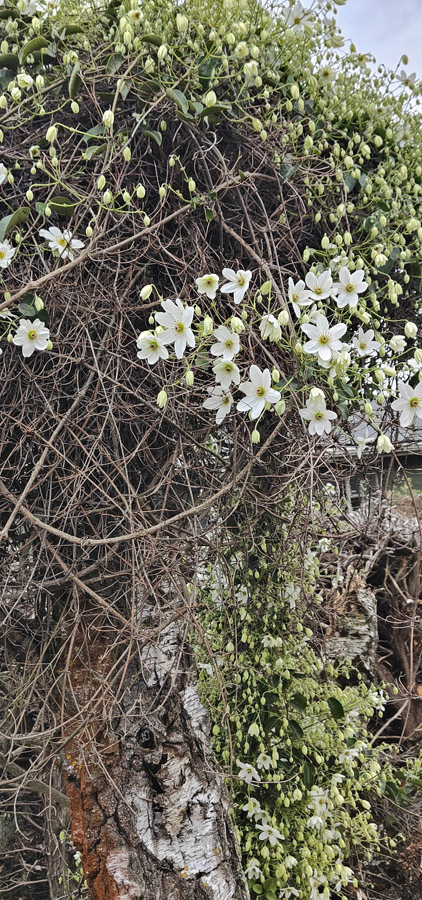A few weeks ago we talked about an “early Spring”, simply because I thought some of my plants were flowering a lot sooner than expected. Especially the Clematis paniculata one of the seven native species of Clematis in Aotearoa.
 Picture taken on Sunday 25 August, 2024
Picture taken on Sunday 25 August, 2024
This is one of my favourite Native, New Zealand Climbers, also known as puawānanga, (flower of the skies). It belongs to the Family Ranunculaceae, the buttercup family – it always surprises me how something like Clematis paniculata belongs to the buttercup group, but then again, our plant taxonomy often has little to do with “resemblance”.
I planted our Clematis some 6 years ago near the base of a dying old Birch tree. That birch literally karked it in the next six months, so it was the perfect tree for the climber to climb on.
“Flower of the skies” needs to grow into the light, that’s where the flower buds will develop. The more exposed to sunlight, the better the buds develop.
Another important consideration is that the roots of the Clematis need to be in moist, cool soils, according to all the old horticulture books. Gardeners translate this to “cool, moist, shady roots and flowers in warm, dry and bright, sunny places”. (I have always questioned the “cool, moist shady roots” bit as when you buy the plants from garden centres, they’ll often be in black, warm and dry plastic pots!)
Having said that: the soil in which roots grow in gardens tends to be cooler than the conditions in which plants are kept on the Garden centre’s shelves…
Ever since our Clematis grew up on the old, dead birch tree, the number of flowers increased dramatically. Spring-time flowering is spectacular, and I can’t control myself at this time of the year: always taking pictures as soon as the flower buds begin to adorn the (by now) decaying old trunk.
Trouble ahead: This old Birch is nearing its last few years of strength. There will come a time when the Clematis will encounter serious struggles as a result of a collapsing, dead Birch! I am already thinking about another site for Clematis: some of the common Ozzie hardwood trees (Eucalyptus, Acacia, wattle, etc) are very tough and long-lasting structures even after death. This may well be a great (and long-lasting) climbing rack for our native Clematis.
The good thing about training them up a dead tree is the abundance of warm sunlight for the buds.
A few days ago I browsed through my collection of Clematis pictures on the computer. That’s when I found some pics (and dates) of flowering. All were starting the show in the third week of August.
And right now – as this program goes to air, they always look like this:

It looks as if Clematis the Climber is regular as clockwork!
LISTEN ABOVE
Take your Radio, Podcasts and Music with you










